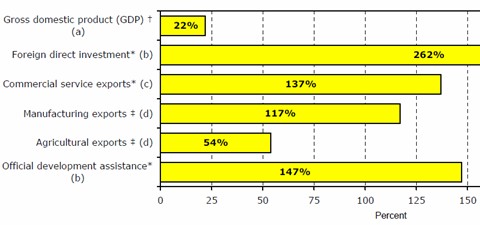
There is plenty of statistical candy to consume in the CIA Factbook‘s latest net migration figures. We had no idea, for example, that people were actually flocking to strife-torn Cyprus, or that Grenadians were so hot to leave the erstwhile Isle of Spice. But what really struck us was a stat that harkens back to a topic of discussion last week: the sheer magnitude of the Guyanese diaspora.
According to the CIA, Guyana’s net migration rate last year was an astronomical -17.31 per every thousand residents. Only a few South Pacific specks saw people flee at a greater clip, though those nations’ figures are obviously skewed by their tiny populations. If we confine ourselves to looking only at countries with populations in excess of 100,000, then Guyana is the undisputed king of exporting human beings.
As this report from the Migration Policy Institute shows, Guayana’s population would swell by over 54 percent if all of its departed citizens returned home—and that doesn’t count the children those Guyanese migrants have had abroad. It’s also worth noting that the most educated Guyanese citizens are the one most likely to skedaddle; 85.9 percent of those with college degrees vote with their feet to move elsewhere.
The departed send plenty of money back home, to the point that remittances form 22 percent of GDP. But the figure on the chart above that really caught our eye is the one comparing remittances to foreign direct investment. As you can see, remittances dwarf the amount of cash that foreigners pump into Guyana’s economy, which strikes us as a very big problem. Investors see Guyana as a hostile place to do business, largely due to major governmental corruption and a lack of adequate policing. Yet unlike other nations bedeviled by similar problems, Guyana has a relatively quick and easy immigration pipeline to the U.S. and Canada, two of the most prosperous nations on Earth. (Some of this human traffic is legal, but illegal movement is common across the border with Suriname.)
At this rate, we do wonder if Guyana will essentially be devoid of people by 2050—a Central American version of North Dakota. Maybe the snazzy new Turkish-run casino will help turn things around.


Brian Moore // Mar 15, 2010 at 4:46 pm
This is part of the reason I support very open immigration/emigration policies. As you note, Guyana’s not a real fun place to be, so people tend to leave. Imagine if someone one offered us an aid development program that would increase the standard of living of 1/3rd of Guyana’s citizens to (pessimistic estimate) the lower quartile of US or Canada, for only a few hundred dollars per person. We’d jump at the chance.
But that’s exactly what allowing this immigration enabled. If by 2050 Guyana becomes a depopulated nation due to emigration, I will cheer — because it will mean that the other 2/3rds successfully escaped to somewhere they obviously thought was much nicer than there.
If there was a single political reform that I could implement across the world, it would be open immigration. No matter how bad a country is, being able to leave makes things much better.
Brendan I. Koerner // Mar 15, 2010 at 5:22 pm
@Brian Moore: Agreed, we should be doing more to let people vote with their feet. Ideally, the countries that are losing population will do something to right the ship and attract immigrants back home. In Guyana’s case, that would mean addressing a) unemployment (particularly for youth) and b) crime, the two issues most frequently cited by immigrants as the reasons for their departures.
If Guyana were a corporation that was unwilling to compete, it could be allowed to file for bankruptcy and be absorbed into another organization–or just disappear altogether. But that’s not quite possible with a sovereign nation, and there’s always a danger that a failed state will become a security problem for its neighbors.
As an aside, in the course of researching this post, I came across a 1980 paper and analyzed Guyana’s late ’70s efforts to attract its most economically successful immigrants back home. Not surprisingly, the plan didn’t work–the grand total of returnees was significantly less than 500, despite some pretty big carrots. One big reason? People who prospered in the U.S. and Canada were concerned that the Guyanese government would eventually seize their private property. The whole revolutionary socialist stance did that country few economic favors.
Brian Moore // Mar 17, 2010 at 3:55 pm
Wow, very interesting on the “come home to Guyana” program, though not too surprising a result.
The “they might seize my stuff when I come back” is really interesting too — it shows just how important basic institutions are far enabling economic success.
Thanks!
Brendan I. Koerner // Mar 17, 2010 at 4:41 pm
@Brian Moore: Guyana was a crazy place throughout much of the ’70s and ’80s–and I’m not just talking about Jonestown. I actually covered one of the nuttier episodes on the blog last year:
https://microkhan.com/2009/07/14/the-king-of-guyana-via-the-cleve/
Also interesting that one of their quasi-Marxist presidents in the ’90s was an elderly Jewish lady from Chicago:
http://en.wikipedia.org/wiki/Janet_Jagan
Guyana may be many things, but “boring” is not one of them.
Brian Moore // Mar 19, 2010 at 9:21 am
Oh, I completely forgot about that, I remember really liking that first post — since I currently live in Cleveland.